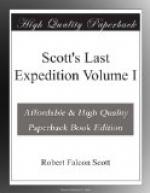In the morning watch we began to move again, the ice opening out with the usual astonishing absence of reason. We have made a mile or two in a westerly direction in the same manner as yesterday. The floes seem a little smaller, but our outlook is very limited; there is a thick haze, and the only fact that can be known is that there are pools of water at intervals for a mile or two in the direction in which we go.
We commence to move between two floes, make 200 or 300 yards, and are then brought up bows on to a large lump. This may mean a wait of anything from ten minutes to half an hour, whilst the ship swings round, falls away, and drifts to leeward. When clear she forges ahead again and the operation is repeated. Occasionally when she can get a little way on she cracks the obstacle and slowly passes through it. There is a distinct swell—very long, very low. I counted the period as about nine seconds. Everyone says the ice is breaking up. I have not seen any distinct evidence myself, but Wilson saw a large floe which had recently cracked into four pieces in such a position that the ship could not have caused it. The breaking up of the big floes is certainly a hopeful sign.
’I have written quite a lot about the pack ice when under ordinary conditions I should have passed it with few words. But you will scarcely be surprised when I tell you what an obstacle we have found it on this occasion.’
I was thinking during the gale last night that our position might be a great deal worse than it is. We were lying amongst the floes perfectly peacefully whilst the wind howled through the rigging. One felt quite free from anxiety as to the ship, the sails, the bergs or ice pressures. One calmly went below and slept in the greatest comfort. One thought of the ponies, but after all, horses have been carried for all time in small ships, and often enough for very long voyages. The Eastern Party [4] will certainly benefit by any delay we may make; for them the later they get to King Edward’s Land the better. The depot journey of the Western Party will be curtailed, but even so if we can get landed in January there should be time for a good deal of work. One must confess that things might be a great deal worse and there would be little to disturb one if one’s release was certain, say in a week’s time.
I’m afraid the ice-house is not going on so well as it might. There is some mould on the mutton and the beef is tainted. There is a distinct smell. The house has been opened by order when the temperature has fallen below 28 deg.. I thought the effect would be to ‘harden up’ the meat, but apparently we need air circulation. When the temperature goes down to-night we shall probably take the beef out of the house and put a wind sail in to clear the atmosphere. If this does not improve matters we must hang more carcasses in the rigging.
Later, 6 P.M.—The wind has backed from S.E. to E.S.E. and the swell is going down—this seems to argue open water in the first but not in the second direction and that the course we pursue is a good one on the whole.




